- Home
- Juliet Marillier
Heart's Blood Page 6
Heart's Blood Read online
Page 6
The voice of reason told me there was no need to open it right now. There were small mountains of other documents to sort, not to speak of sweeping the floor, wiping away the dust that coated every surface, airing the room, establishing a storage system so I would know where to find things. I cleared a space on one of the bigger tables by the crude method of pushing everything else out of the way and got out the folding wax tablet I kept for making notes. It had seen good use over the years. I had learned my letters on it, my small hand wielding the stylus at first awkwardly, later with more control, as I formed the foundations of my craft. The tablet was shaped like a book, with a hinged wooden cover. A leather strap held it closed when not in use, and the stylus had its own pocket. The wax surfaces, protected thus, had remained clean and serviceable. I would use this to keep daily records of my work and to note down which documents were located where. Parchment and vellum were too costly to be squandered on such ephemeral writings. I opened the tablet, glanced around the library and sighed. I could feel that box calling to me. Read, it whispered. Read and weep.
I wouldn’t be able to set my mind to any other work until I dealt with this. I moved to the window and opened the box. No demons sprang forth. Inside, an assortment of items was neatly stowed. For the most part the contents were leaves of parchment, rolled in bundles and tied with disintegrating cords. Herbs had been sprinkled between the bundles long ago. These had dwindled to dust, but a faint sweet scent lingered on the pages, which were starting to crumble away at the edges. I reached for a bundle, then froze, gripped by a sense that someone was watching me. My skin prickling, I straightened and looked about me.The door to the garden stood ajar, but if someone had been there, he had vanished between one breath and the next. A faint scent of herbs lingered, sage and rosemary. I glanced out the window, but could see nobody. Get a grip on yourself, Caitrin. This place is odd enough without adding your own imaginings. I bent again to my task, lifting out each bundle of documents in turn and setting them side by side on the table. At the very bottom of the box was something wrapped in black cloth. I hesitated, then picked this up and placed it before me, unfolding its shroud with hands that were not entirely steady.
Perhaps I should have known it would be a mirror. This one was of obsidian, and something about it made me uneasy. The enigmatic black surface showed little reflection. I had read of such a mirror somewhere, I was certain. A dark mirror, used for divination. The artifact was in a silver frame crawling with eldritch creatures, each no bigger than a joint of my little finger, their eyes set with miniature stones of red or green. I blinked and stared anew. Hadn’t that gnomelike homunculus been at the bottom of the mirror last time I looked? And what about that being that was part sprite, part lizard? It had been curled up on itself and now it was looking right at me ...
I shook my head to clear it of such fancies. I would begin to sort these loose sheets, starting with the ones in the worst state of repair. If Anluan had any sense, that would be where he had begun his own somewhat limited attempt to do the job, so I would perhaps find the next part of that intriguing narrative somewhere amongst these deteriorating pages. So he’d lost the use of his right hand. I pondered this, wondering whether, if I tried using my left, my writing would be even more wayward than his. I had heard that a person could learn to use the other hand just as well, given time. Perhaps Anluan had not had time. Or perhaps he had lacked the will. He’d given up trying to talk to me quickly enough.
All of the documents from the little chest seemed to be in the same writing, a bold, regular hand.The style of script was antique and the penmanship was that of a scholar. The pages were so brittle there seemed a danger they would fall apart before I could get the job done, and the ink had faded badly. Little life remained in these records.
I skimmed the pages. One or two were in Latin, but most were in Irish and dealt with nothing more nefarious than an account of the daily life of house and farm:... a good crop of new lambs, most of the ewes have dropped a pair, some three ... weather mild, fewer losses than last year ...
... dispute with Father Aidan, who considers my area of study perilous. Nothing new in that.
Fergus got an excellent price for our calves at this year’s market.
I have a son.They tell me he is healthy, though he appears red-faced and small. I am surprised, not at his fighting spirit, but that my wife has at last proven herself useful at something.
That jolted me. I had been beginning to warm to the writer, an ordinary man making a record of losses and gains on his farm—sheep, cattle, where had they been kept?—and debating issues with the local priest. But after that callous remark, I found I could not like him at all. My area of study. Likely the writer was one of the unusually scholarly chieftains of Whistling Tor.
He is to be named Conan, for my father.
I began on the second bundle of papers. For these the scribe had used Latin and a different style of script to go with it, a rounded half-uncial rather than the common hand of his Irish writings. Or perhaps this was a different writer.The pages seemed of similar age, the ink equally faded.
Autumn of the thirteenth year of the tenure of Glassan son of Eochaid as high king.We approach the time known as Ruis, in Christian nomenclature All Hallows. A time of transition, when we step into the dark. A time when end is beginning and beginning end.
Not only was this Latin, but the style of expression was more formal. I smoothed the page out carefully. The parchment had been scraped back and reused at least once, perhaps several times; it seemed there had not always been a ready supply of materials at Whistling Tor. I tried to guess the document’s age. Glassan son of Eochaid. A hundred years, give or take a little? Hadn’t Tomas or Orna said something about a hundred years of ill luck? I couldn’t find the writer’s name anywhere on the pages, but perhaps if I read on, it would be there.
The dark mirror flickered. I turned to look over my shoulder, half expecting to see Muirne there with her neat clothing and disapproving expression. But there was nobody; I was alone in the library. I turned back and my gaze caught a touch of red, not in the mirror but out in the garden. Had it been Anluan whose presence I had sensed before, standing in the doorway watching me without a word? He was seated on the bench now. He had his left elbow on his knee, his right arm across his lap, his shoulders hunched, his head bowed. White face, red hair: snow and fire, like something from an old tale. The book I had noticed earlier was on the bench beside him, its covers shut. Around Anluan’s feet and in the birdbath, small visitors to the garden hopped and splashed and made the most of a day that was becoming fair and sunny. He did not seem to notice them. As for me, I found it difficult to take my eyes from him.There was an odd beauty in his isolation and his sadness, like that of a forlorn prince ensorcelled by a wicked enchantress, or a traveler lost forever in a world far from home.
I must stop being so fanciful. Less than a day here, and already I was inventing wild stories about the folk of the house.This was no enchanted prince, just an ill-tempered chieftain with no manners. If he’d been spying on me, that was his prerogative as my employer, I supposed; after all, I was on trial. I turned my attention back to the documents. The words on the page swirled and moved, and I rubbed my eyes, annoyed at my lack of concentration.
I have applied myself assiduously to the great work of preparation. I keep the door locked.That does not stop the ignorant from seeking my attention with intrusive knocking. The child was sick—some minor malady, a cough, a slight fever. It was inappropriate to call me; trivial domestic matters are for others to deal with. It is for precisely this reason that our principal place of experimentation is situated beneath the floor level of the house, guarded by bolts and key, and by charms and wards to keep out marauders of a less earthly kind. The minds of ordinary folk cannot comprehend the nature of our work ...
Something moved on the surface of the obsidian mirror. I glanced quickly, started with shock, stared deep, the hair standing up on my neck. Surely not ... but there
it was. Within the dark stone was the image of a man standing in an underground chamber, a long, shadowy place lined with shelves on which stood crucibles, flasks, jars of powders and mixtures, books ... so many books in one place, their covers stained and worn as if from long and frequent handling. Anluan . . . No, this man was much older. In the uneven light from candles set around the chamber, his features became those of a carven saint: the eyes deep and penetrating; the mouth thin-lipped, disciplined; the bones of cheeks and jaw jutting beneath the pale skin.With long-fingered, dexterous hands he sorted implements on the bench before him, knives with odd-shaped blades, pincers, screws, other things whose uses I could only guess at. This one. He selected a gleaming instrument like a miniature scythe. I’ll get my answer from the old hag with this one.
A chill ran through me. I shut my eyes, opened them again in disbelief, my gaze moving between the lines of black script and the gleaming surface of the dark mirror. What was this? I could see the work chamber of the document as if I were standing right there opposite the writer. I could see his long, ascetic face as he pondered the dilemma facing him. And I knew his thoughts; knew them and felt the edge of a terrible darkness touching my mind. How could this be? I was here, in the library by full daylight, and yet I was in that underground place, my hands feeling the touch of cold metal as the man took up his blade; my mind knowing his evil purpose. The mirror ... the mirror held the memory of time past, and as my eyes fell on it once more I felt the man’s presence as if he and I were one. Now there was no looking away.
The old woman lies on the table, grimly silent. He’d been confident of achieving success before Aislinn got back with the herbs, but the crone is holding out beyond all expectations. She knows, of course. Of all the local women who dabble in a little white magic, this one has the reputation as the most experienced, the one who will understand without a doubt exactly what is meant in the grimoire by potent powders of summoning. But this wrinkled ancient with her parchment skin and her crooked fingers isn’t giving the secret up easily. Perhaps she is so old she no longer fears death; she may be using what arts she has to dull the pain. She’s already endured techniques that would make grown men soil themselves.
He’s conducted such interrogations before, though not often. They follow a logical sequence. If a person holds out to the point where one risks losing him without a result, it becomes more effective to transfer one’s attention to someone else, someone with whom one’s subject has a bond—the husband or wife, a child, an aged parent.There is a weak chink of that kind in the strongest armor. But this old woman has no family. She’s lived by herself in the woods for years.
He sighs. His hands are filthy. It will take vigorous scrubbing to get the blood out from under the nails.The crone’s breathing is a squeaking rustle, another irritant. He doesn’t look at her; such disorder offends his eye. And now Aislinn is coming back, he can hear her at the door.
“Are you done, my lord?” the girl asks politely, coming in and locking the door after her. She is thorough as always; he has trained her well.
“I haven’t got a thing.” There’s no need to pretend with Aislinn. She knows everything about him, to the extent that a simple village girl can understand a mind like his, a mind that soars above those of ordinary folk like a great eagle above the creeping, crawling creatures of the earth. His thoughts reach for the high, the impossible, the stuff of dreams and visions. “I don’t want to kill the witch before she’s given me the answer—I can’t understand why she would hold it back, she’s near death anyway, why take such valuable information to the grave?”
“I have something that may help,”Aislinn offers unexpectedly, her tone sweet.“I went back to her cottage after I gathered the herbs I needed. And I found this.” She holds up a bundle, and the woman strapped onto the table lets out a hissing sound, her reddened eyes rolling towards what the girl is carrying.
“Ah!” His breath comes out in a rush of triumph. He takes the little dog from Aislinn and carries it over to the tabletop, close to the woman, so she can see. A warmth floods through his body, the anticipation of success. “Aislinn, you may go out if you wish.”
“I’ll stay and watch, Lord Nechtan.”
The creature in his hands is quite small. It is not yet frightened—it has recognized its mistress and is straining to get close enough to lick her face. “I think we may be ready to talk,” says the chieftain of Whistling Tor. And when the woman replies only with a moan of horror, he gets out his thin-bladed knife, weighing it casually in his free hand.“I’m an artist at this. Watch me and learn.”
When it is over, he disposes of the debris while Aislinn cleans. The crone was all too ready to gasp out the names of the ingredients once he began to work on her creature. Aislinn has written them down in her little book, precise by measure, each in its turn. There was just time to get the last. Now he and the girl are the only living beings in the subterranean chamber, save things that scuttle and crawl in the corners and rustle in the walls. Not many of those: Aislinn keeps it spotless.
He watches her now as she scrubs the table.What a difference a year or two can make. Aislinn was a child when she first came to his notice; he did not expect a serving girl to show such intense interest in the maps and charts spread out in the chamber whose floor she was sweeping. He did not expect the orphaned daughter of humble villagers to be such a quick learner, thirsty to master reading, writing and numbers, then move into more esoteric branches of study. His protégé has been clever, eager to please and a great deal more patient than he is, which makes her an invaluable assistant. Time has passed, and Aislinn is no longer a child. Her hair is a fall of liquid gold; her pert buttocks move to and fro as she swings the brush. He’s suddenly hard for her, desire thrumming in his blood. No doubt she would be as quick to learn the arts of the bedchamber as she’s been with sorcery, and what pleasure he would take in the teaching.
But no. He cannot allow himself this; there are priorities. He must obey to the letter the information he got from Saint Criodan’s: the vital knowledge that was so astonishingly expensive to acquire. Let me show you the woeful state of our roof, Lord Nechtan; it will be quite costly to repair. Who would have believed Brother Gearalt would hold out for such a generous donation to the monastic funds before opening the doors to that secret collection within the foundation’s library? Oh, a dark collection it was, full of intriguing surprises.The good brother didn’t let him take the book away. He was given only long enough to find and read the one form of words. It was enough. He knew what he wanted.
“How quickly can you make up the mixture?” he asks Aislinn.
“It might take a number of days, Lord Nechtan.” The girl pushes her hair back from her brow. He imagines the pale strands drifting across his bare body; he thinks of her under him, yielding. “Goldenwood has to be gathered in a particular way. And some of the ingredients need grinding thrice over.” After a moment she adds, “I can stay on and work late. I can sleep in the corner there.”
There’s a pallet each of them has used from time to time when an experiment needs watching; they take turns to rest. Now that she’s older, that no longer seems wise. But time is of the essence, for All Hallows is drawing close. The pieces must be ready to slot in place by then or there will be a whole year more of waiting. Another whole year of Maenach stealing his cattle as if he has every right to do so. Another whole year of being ostra cised because nobody understands the significance of his work. A year of slights and offenses, injustices and dismissals. It is unthinkable. “So close,” he muses. “Less than a turning of the moon and then, such power . . . Power such as none of them can possibly dream of, Aislinn, the capacity to dominate not only wretched Maenach and the rest of my neighboring chieftains, but the whole district, the whole of Connacht, the whole of Erin if I want it.Against my army, none will stand. It will be a force worthy of a great hero of mythology, such as Cu Chulainn himself. I can hardly believe it is within my grasp . . . We must not waste a moment. This mu
st be precise in every detail.”
They go back to work. Aislinn mixes powders, grinds dried berries, measures liquids with meticulous attention. He pores over his notes, though he has long since committed the charm to memory. He knows it deep in the bone, a potent, living thing. It is his future. It is his raising up and the doom of his enemies. It is, purely and simply, power.
The light in the underground chamber dimmed. The image wavered and faded, and with a shudder I came back to myself. Here in the library the sun was streaming in the window to set a brightness on the parchment before me. It was glinting off the surface of the obsidian mirror, on whose border the little creatures were now huddled or curled into postures of sorrow or fear, heads under wings, hands over eyes, arms around one another, as if what had been revealed were too piteous to behold.
Oh God, oh God . . . Tears spilled from my eyes. Foul thoughts and obscene images crowded my head. I felt filthy, soiled, wretched. Bile rose in my throat, bitter and urgent. Out! Out of this cursed place! I blundered across the chamber, bruising my hip on the sharp corner of a table, and stumbled out into the garden, where I sank to my knees and retched out the contents of my stomach under a lavender bush. My gut heaved and heaved again. Between the spasms I fought for breath.
A hand on my shoulder. I started violently, Nechtan looming in my mind, and the hand was withdrawn.
“What is it? You are ill.” A man’s voice. I had forgotten Anluan, in the garden. “I’ll call for Magnus,” I heard him say.
“No!” Through the paroxysms of my gut and the dark visions in my head, I had enough awareness to know I did not want the all-too-busy steward called away from whatever he was doing to tend to me.“I’m sorry. I know I shouldn’t be in your garden. I’ll be all right in a moment—” As if to make me a liar, a new fit of choking and retching gripped me. My nose and eyes streamed.

 Den of Wolves
Den of Wolves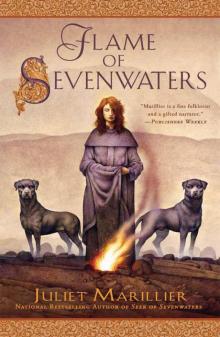 Flame of Sevenwaters
Flame of Sevenwaters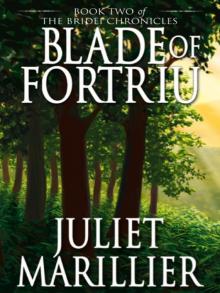 Blade of Fortriu
Blade of Fortriu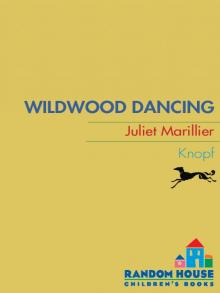 Wildwood Dancing
Wildwood Dancing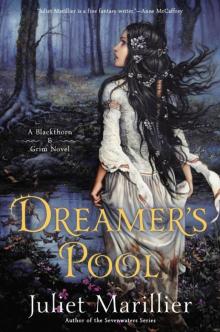 Dreamer's Pool
Dreamer's Pool Raven Flight
Raven Flight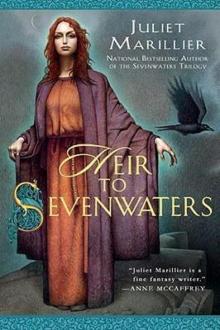 Heir to Sevenwaters
Heir to Sevenwaters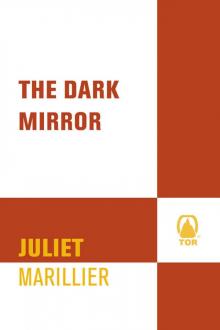 The Dark Mirror
The Dark Mirror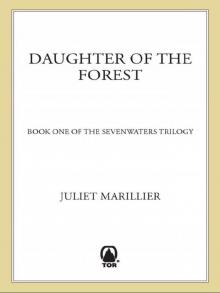 Daughter of the Forest
Daughter of the Forest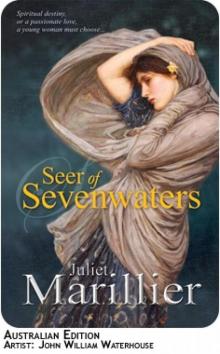 Seer of Sevenwaters
Seer of Sevenwaters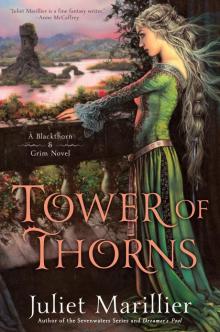 Tower of Thorns
Tower of Thorns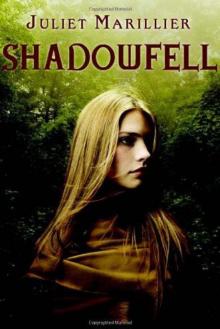 Shadowfell
Shadowfell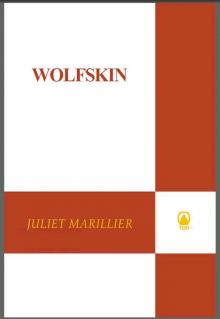 Wolfskin
Wolfskin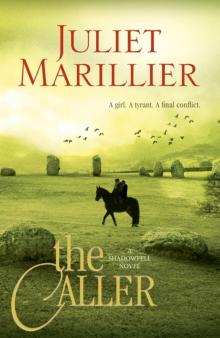 The Caller
The Caller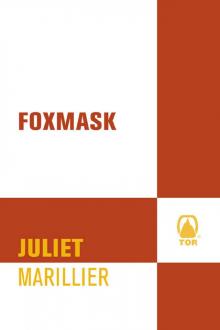 Foxmask
Foxmask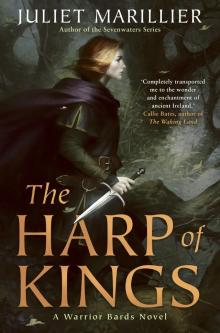 Harp of Kings
Harp of Kings The Well of Shades
The Well of Shades Heart's Blood
Heart's Blood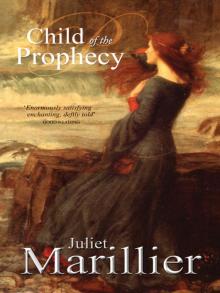 Child of the Prophecy
Child of the Prophecy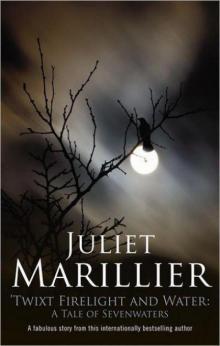 Twixt Firelight and Water
Twixt Firelight and Water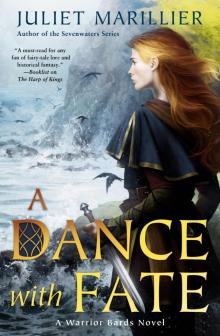 A Dance with Fate
A Dance with Fate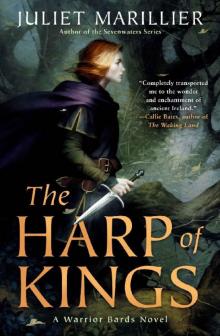 The Harp of Kings (Warrior Bards)
The Harp of Kings (Warrior Bards)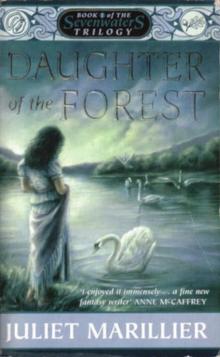 Daughter of the Forest (The Sevenwaters Trilogy)
Daughter of the Forest (The Sevenwaters Trilogy)![Sevenwaters [06] Flame of Sevenwaters Read online](http://i1.bookreadfree.com/i2/04/08/sevenwaters_06_flame_of_sevenwaters_preview.jpg) Sevenwaters [06] Flame of Sevenwaters
Sevenwaters [06] Flame of Sevenwaters![[Sevenwaters 04] Heir to Sevenwaters Read online](http://i1.bookreadfree.com/i2/04/12/sevenwaters_04_heir_to_sevenwaters_preview.jpg) [Sevenwaters 04] Heir to Sevenwaters
[Sevenwaters 04] Heir to Sevenwaters